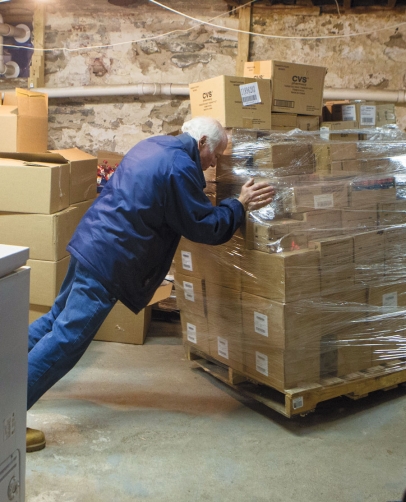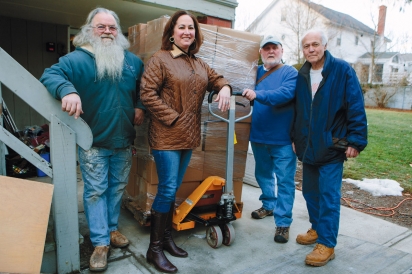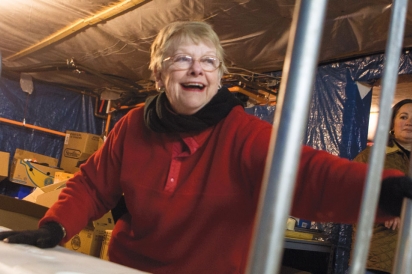We Share Hope
Food Rescue Missionaries Aren’t Talkin’ Trash about Food Waste
Food waste isn’t just leftovers scraped off your plate after dinner. It’s perfectly edible fruits and vegetables not attractive enough to be featured on supermarket shelves; it’s food from a bakery or restaurant that has gone unsold; it’s food tossed out because the “sell-by” or “best-if-used-by” dates have expired (which, by the way, rarely—if ever—indicates anything about food safety or if a food is still edible).
The problem of food waste is obvious to the federal government. In September 2014, Agriculture Secretary Tom Vilsack and EPA Deputy Administrator Stan Meiburg announced the nation’s first national food waste reduction goal, calling for a 50% reduction of food waste by 2030.
According to the National Resources Defense Council, 40% of edible food in the U.S. goes to waste. It’s not just food that is wasted; money, water and other resources are also wasted when food is not consumed. And uneaten food rotting in landfills contributes greenhouse gases to the atmosphere.
The U.S. spends $750 million per year to dispose of wasted food. A mere 15% reduction in that figure would feed 25 million people, and there are plenty of families that could use the nourishment.
Food security, as defined by the USDA, is “access by all people at all times to enough food for an active, healthy life.” A total of 17.4 % of Rhode Island households are either food insecure or have very low food security.
According to Rhode Island—based “food rescue” organization We Share Hope (WSH), the need for food is as great as the supply [of wasted food] is limitless.
It started when James “Jimmy Mac” MacDougall, a Rhode Islander with a background in corporate financial administration, wanted to do something to help those in need and began buying food at cost from a local store to distribute to the hungry.
Shortly after, Stephen Martin, another Rhode Islander and old friend of MacDougall’s, started a lunch ministry with his wife, buying supplies at his local supermarket and making sandwiches at home, then delivering them to the hungry in his community.
What happened next was “divine providence,” or, as WSH refers to it, “the Holy Spirit working through us.”
MacDougall had a connection at a bakery and found himself with 900 loaves of bread. Martin was looking for some way to meet the overwhelming need he and his wife encountered.
MacDougall, with 900 loaves of bread, connected with Martin, who was making sandwiches, and the seeds for WSH were sown.
Fast-forward seven years plus, the two have continued to spread their gospel, making inroads for WSH across the state and growing their nonprofit. Also part of the team now are Bob Nichols, Roy Allen, Peter Letendre, April Martin and Christina McKibbin, as well as other board members and many additional volunteers, all of whom contribute in countless ways to their success.
Now flourishing throughout Rhode Island and Southeastern Massachusetts, WSH feeds thousands of people by “rescuing” food that would otherwise be thrown out.
“People are hungry seven days a week so we work seven days a week,” says Martin. “Much, much more food can be rescued than is rescued.” According to MacDougall, “The supply is limitless.”
On a bitterly cold January morning I met MacDougall and Martin at a church in Providence to watch WSH in action.
At 8:20 am a line snaked around the building and down the block. I parked my car and walked into an enormous, empty church basement. Volunteers were putting 10-foot tables in long rows when the 27-foot refrigerated truck from WSH arrived, packed front to back and bottom to top with food and supplies. The truck’s arrival set off a flurry of activity.
Gigantic four-foot coolers filled with meat were off-loaded, muscled down a narrow stairway and around corners by volunteers (who were working in exchange for food). Mountains of bright yellow bananas, 50-pound bags of potatoes, heaps of green peppers and red-net bags full of golden onions (all previously destined for the landfill), were portioned into bags. Sliced cheese, bread, soup, pasta, Egg Beaters, peanuts and other items were arranged on the tables. Garbage bags, lotion, dishwashing liquid, toothpaste, deodorant and shampoo (all rescued) were arranged as well, with refills stored in boxes underneath the tables.
Through WSH I witnessed the unemployed, the disabled, the elderly and the working poor come together in community and roll up their shirtsleeves, happy to be allowed the dignity of hard work to provide for their families.
Families are asked to volunteer four hours per month and give a donation of $2 for the food they receive. Some, if they can afford it, donate more.
To organize the waiting crowd, people in the line (which had grown to over 200) were given numbers. Groups of 10–15 people at a time were let in to shop. Grocery bags and pull carts were filled as Rhode Island’s hungry shopped from the bounty of what would have been wasted.
Every morsel of the food WSH rescues is free and they never say “no” to a donation. Fifteen pallets of broccoli? Sure! One hundred smoked hams? You bet!
WSH receives no federal or state funding, surviving on the donations, both monetary and in-kind, including food donations from local farms. Restaurants have signed on to turn rescued food into nutritious meals that WSH then distributes to the hungry among us.
When the organization needed workspace, both for meetings and to store food, the historic Smith-Winslow house in Warren, Rhode Island, donated space in exchange for help renovating the building (which was done by WSH volunteers).
“The holy spirit has a way of getting us whatever we need,” says Martin.
Working closely with area churches and HUD-supported housing developments enables WSH access to those with greatest need.
Parkway Towers, a 104-unit HUD-supported apartment building that houses elderly, low-income and disabled residents, is a great example. The building, owned by Ferland Properties, is located in East Providence.
Building social worker Carol Aldrich and resident Cathy Peck have worked together with Ferland Properties (which donates storage space and electricity for coolers and freezers) to support a WSH popup supermarket in the building’s community room.
“Residents who don’t have transportation, who are low-income or disabled, now have access to fresh, nutritious food on a regular basis,” says Peck. “They get exercise by walking down to the community room and they benefit from the social interaction. It brings people out, brings them together. There is an added social benefit to the community within our building.”
“Getting management and residents behind the program is key,” says Martin, who views Parkway Towers as a model that could be replicated throughout the country.
When WSH first came to Parkway Towers five years ago the program attracted about 10% of the residents. It now serves 50% of the residents and is still growing.
Donations to WSH from Parkway Towers residents in 2015 totaled over $9,200.
Peck, like all WSH volunteers, works very hard, pretty much seven days a week, to keep the program going. She says, “This program has restored my faith in humanity.”
We share hope indeed.
To find out more about We Share Hope and how you can donate or get involved, visit WeShareHope.org.
Be a Waste Watcher
• Make a list of what you waste each week (for about a month) and see where you stand in the food waste line.
• Plan your meals each week and make a shopping list using a meal plan.
• “Shop” the fridge, freezer and cupboards first; use up what you already have.
• Have “leftover” night once a week.
• Store your food properly and practice “first in, first out” when storing food in the refrigerator.
• Avoid filling the landfill by making donations to your local food bank and by composting vegetable and fruit scraps, coffee grounds, tea bags and other compostable items.
Jackie Lantry is the author of numerous articles focusing on food and family. Her work has appeared in local, regional and national outlets. She lives in Rehoboth, Massachusetts, with her husband, photographer Steve Szydlowski, and four voracious kids.






